
When the power to your house suddenly cuts out
When the power in your house suddenly cuts out—and the neighbours still have lights on—it’s probably an electrical fault. Grab a flashlight and go check out the GFCI receptacle, circuit breaker, main breaker, or fuse box, which is usually in the basement if you have one. If you have a GFCI outlet, try pushing the reset button, suggests networx.com. If you have breakers, check to see whether one of them has tripped or if you’ve blown a fuse (it will be flipped off). Most of the time, flipping the right breaker does the trick (you might have to do some trial and error). If not, it could be time to call a pro.
“Any electrical work poses a risk of danger and, if carried out wrong, can cause serious injury,” says Kyle Gesuelli, home improvement expert at on-demand home services app Handy. “Additionally, if something does go wrong and the work hasn’t been carried out by a certified professional, it will invalidate your insurance.” Call your power company to confirm that it’s not a local outage; then call a licensed electrician. Do not try to handle complex electrical work on your own.
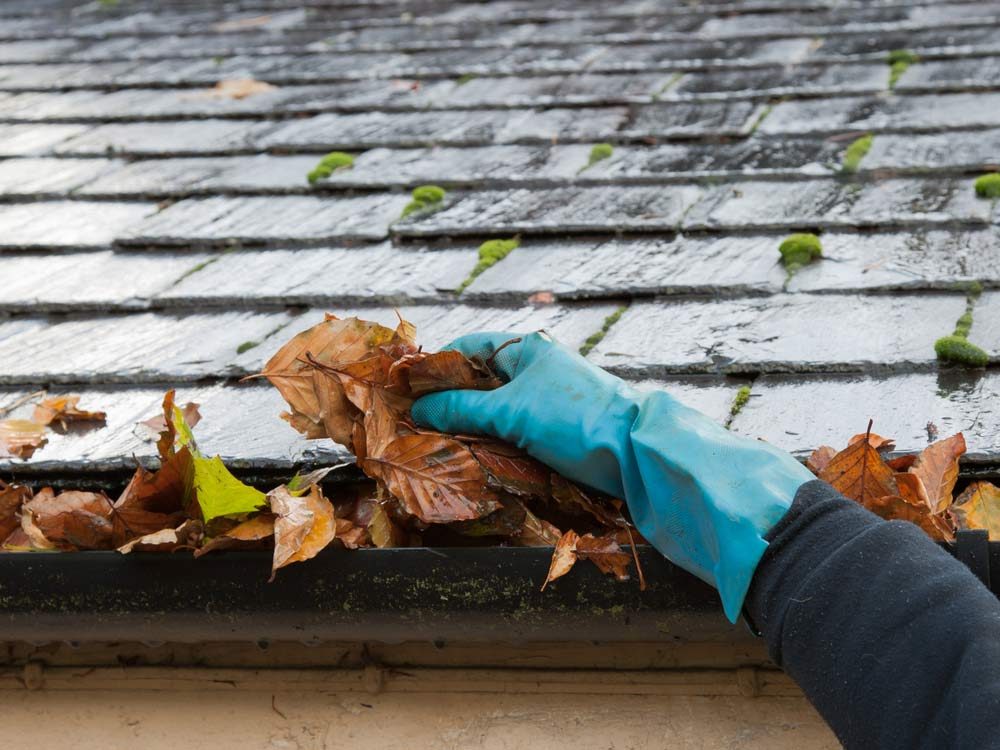
When your home’s gutters are overflowing
A wind or rainstorm can load up gutters with leaves, pine needles, branches, and more, and clogged gutters can cause major damage to your home. If the gutter is close to the ground, you can consider clearing it yourself if you’re handy with a ladder. But Gesuelli warns, “Unless you have experience carrying out work safely while perched on a ladder over six feet from the ground, and are confident doing so, it is wise to consider hiring a professional. That way you avoid risk of injury from a fall.”
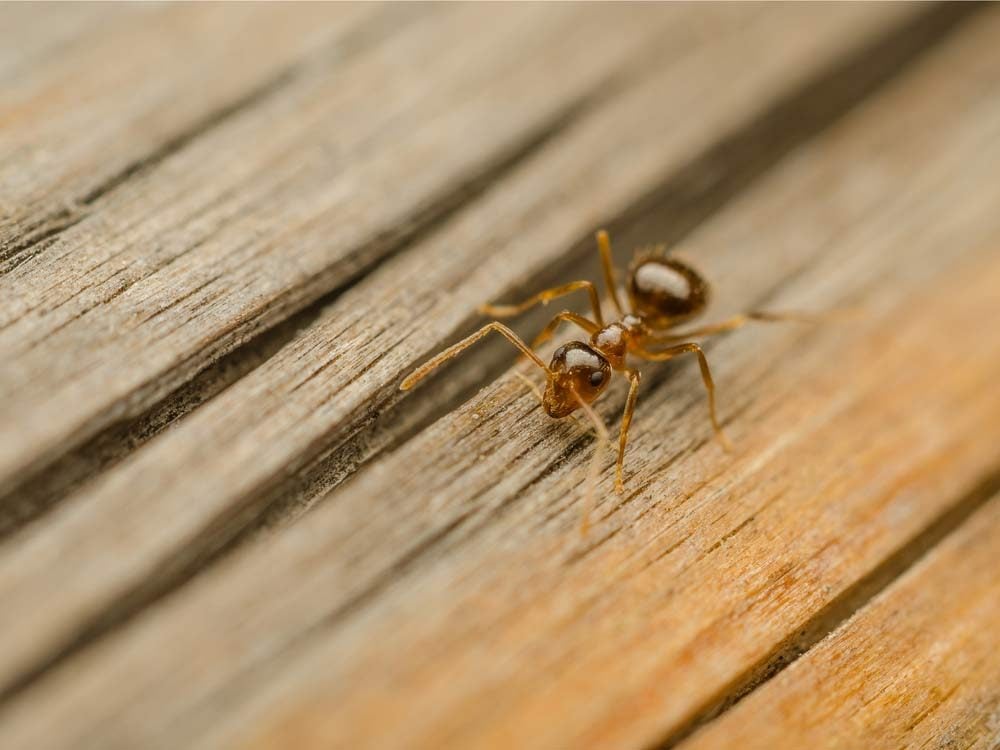
When you have a sudden infestation of ants, flies, bees, or rodents
If the ants are marching—or the bed bugs, bees, mice, bats, bird mites or other pests are taking up residence in your home—grab some over-the-counter pesticide, Gesuelli says, and try to use them in the “hot spots,” where you see the highest concentration of pests. It could be around window frames, in the backs of cabinets, or near pipes. However, if the problem persists or the infestation seems to be getting out of hand, call a pro.

When a tap won’t stop dripping
The constant drip of a leaky tap can be extremely irritating—and waste gallons of water every day. It’s one of the most common reasons people call for a plumber. Before you do, try tightening or changing the washer on the faucet. Gesuelli explains: First turn off the water supply to the tap, either underneath the sink or at the main water valve. Then remove the tap’s cover to reveal a nut or screw. It probably just needs tightening, but unscrew it and take a look at the washer. If it looks worn and like it needs replacing, just pick a new one up at your local hardware store; most are a standard size but bring the old one with you match it. If you aren’t comfortable doing this or the leak is more severe, call a licensed plumber. Check out these industry secrets your plumber won’t tell you.
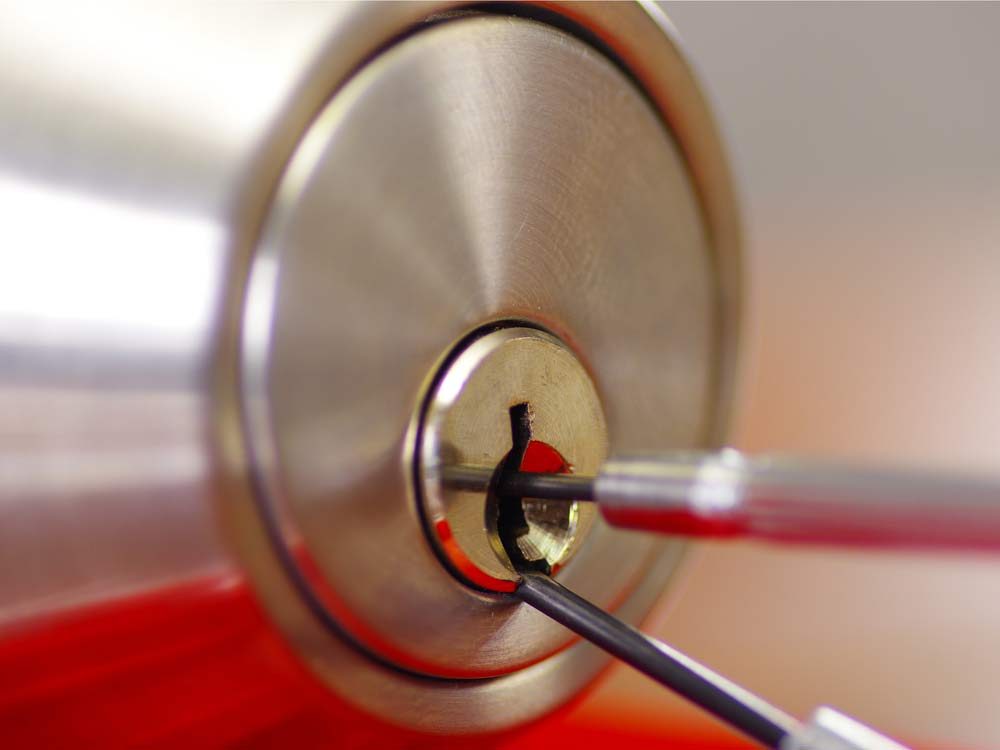
When someone gets locked in the bathroom
Locks get stuck sometimes, and it can be very unnerving, especially for kids. But you don’t have to break the door down or crawl through a window. The first step is to see if the person can be talked through how to unlock the door. If that fails, check the door handle to see if it has a small hole in the centre. If so, use a straightened paper clip to push through the hole and pop the lock on the other side. If this isn’t the case, Gesuelli advises, “loosen the frame by unscrewing the hinges before you give it a good shove. This way, both the door and your bones should remain largely intact.”
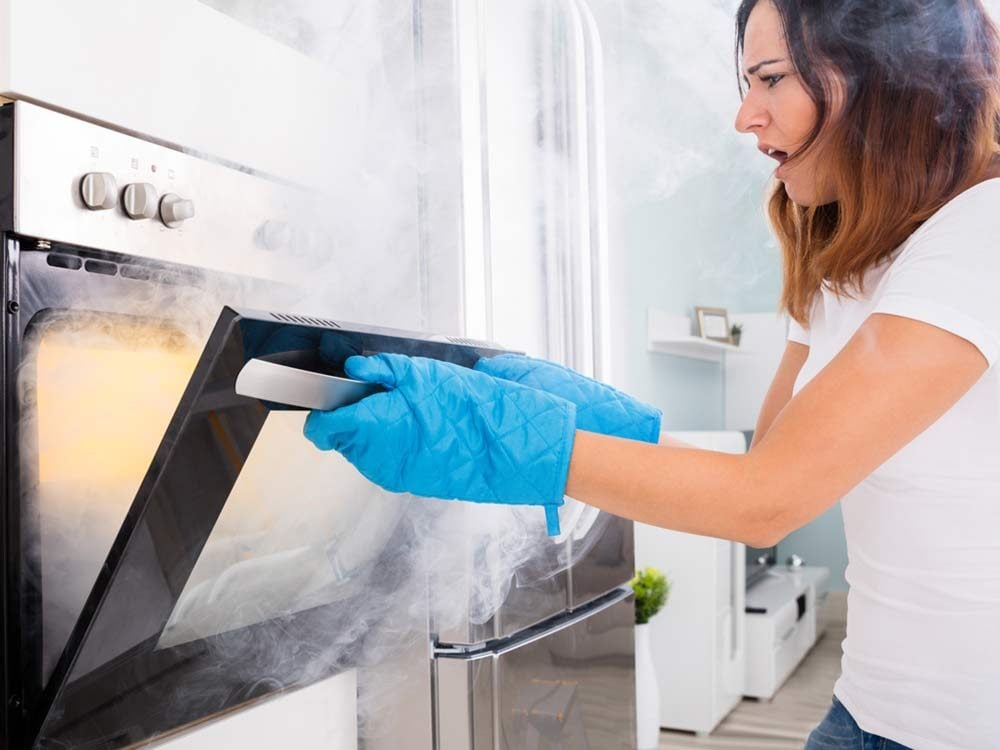
When your oven starts to smoke
When food leaks or drips onto the oven floor, your home is going to fill up with smoke, fast, warns Varda Epstein, a mother of 12 and parenting expert at Kars4Kids. If the bulk of your food is still cooking, so you can’t turn off the oven, sprinkle the drip with a heavy layer of baking soda. “That will stop the smoking, so you can finish cooking,” Epstein says. “Later, use a dust pan and brush to clear the baking soda and burnt on crust, then clean your oven as usual.” Here are more brilliant ways to use baking soda around your house.
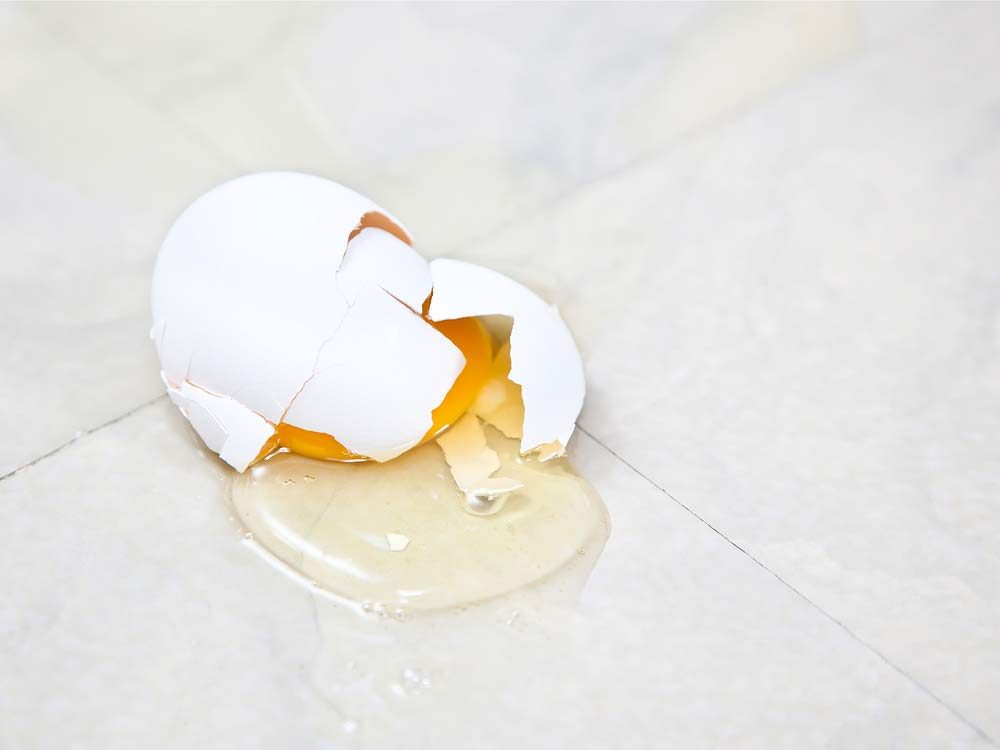
When you smash an egg on the floor
You’re cooking and eggs land on the floor. Smashed eggs aren’t just messy, they can be slippery and dangerous, and one of the most difficult kitchen messes to clean. “Wiping just spreads the raw gloopy egg further,” Epstein says. So here’s her trick: “If you sprinkle the mess with some salt and wait a few minutes, the egg will come together into a firmer mass so you can simply scoop it up, making for far easier cleaning.” Check out these tips for keeping the kitchen cleaner while you cook.
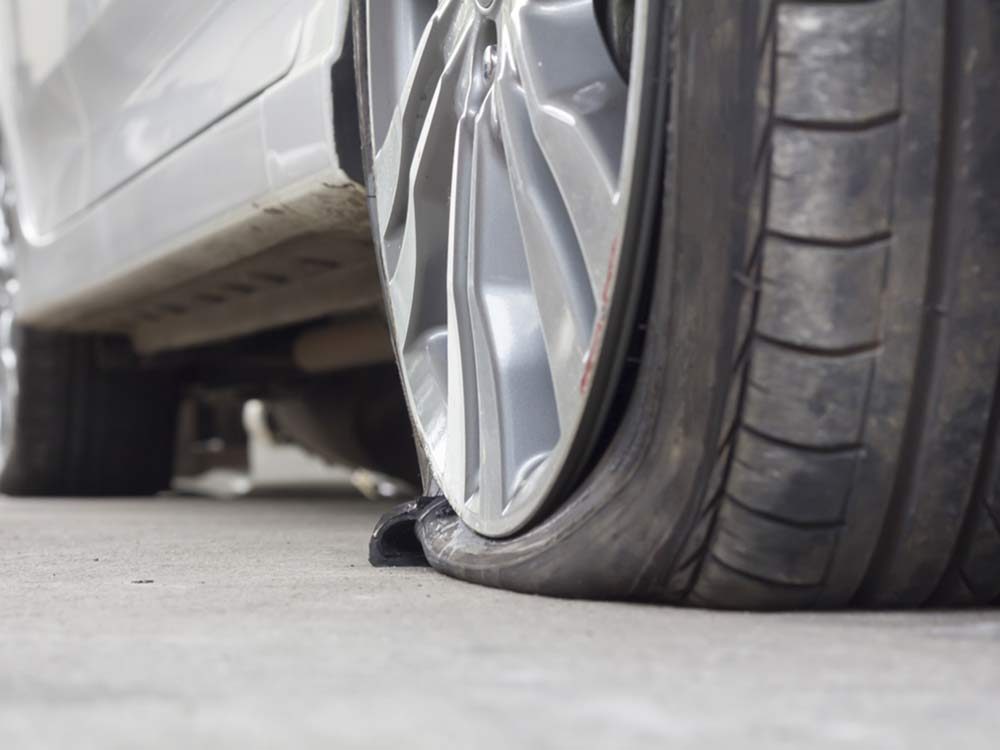
When you get a flat tire
You’re on the road and you start getting that wobbly sensation that means your tire is probably flat. If you’re on a highway, in the dark, or in a dangerous area, call for help. Also call for help if you’ve never learned to change a flat tire. However, if you’ve changed a tire before, have the necessary equipment (a decent spare, lug wrench, and a jack), and are in a well-lit and safe location, you can do it yourself. “Everyone hates to change a flat tire because it’s so difficult to get the lug nuts off the wheel,” Epstein says. “But if you have a cheater bar and a cross wrench, you can get enough leverage to manage the job.”
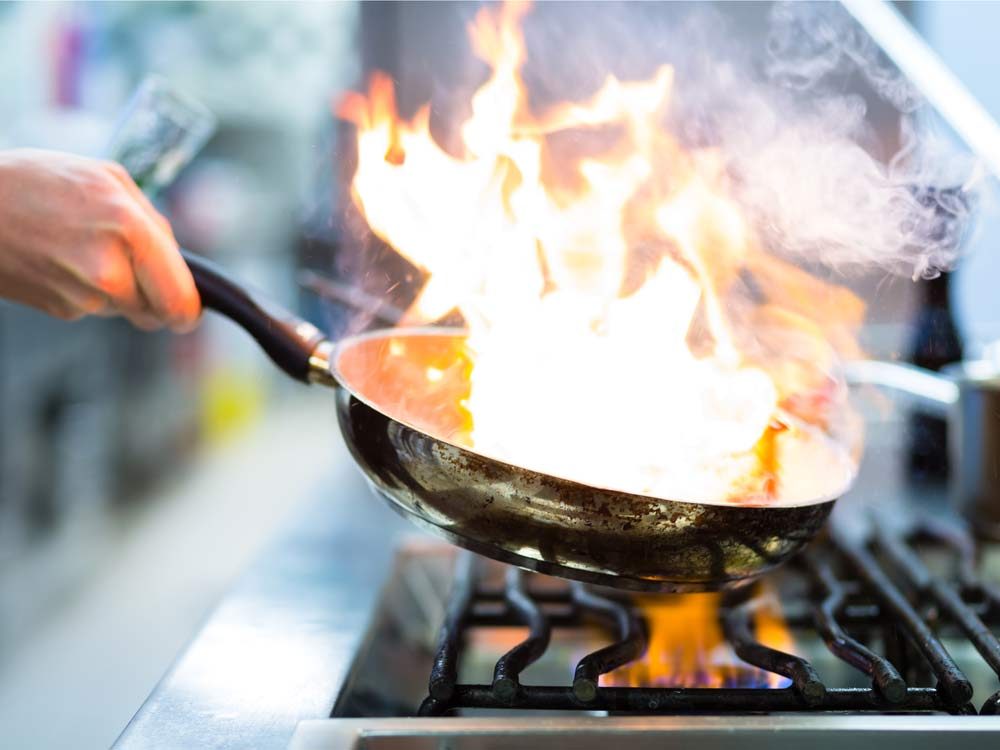
When there’s a fire in your skillet or microwave
With a skillet fire, the first course of action is to turn off the burner and slide a lid on the pan if it’s safe to do so without getting burned. If that doesn’t do the trick, take a towel, soak it with water, squeeze it out and then cover the skillet completely, which should put the fire out, Epstein says. Don’t forget to turn off the burner first! If you have a kitchen fire extinguisher, you could use that instead. If the fire continues to burn for any reason, call 911 and get out of the house. If the fire erupts in the microwave, immediately unplug it and leave the door closed to allow the fire to suffocate, according to sheknows.com. If it looks like the fire is spreading from the microwave, call the fire department immediately.
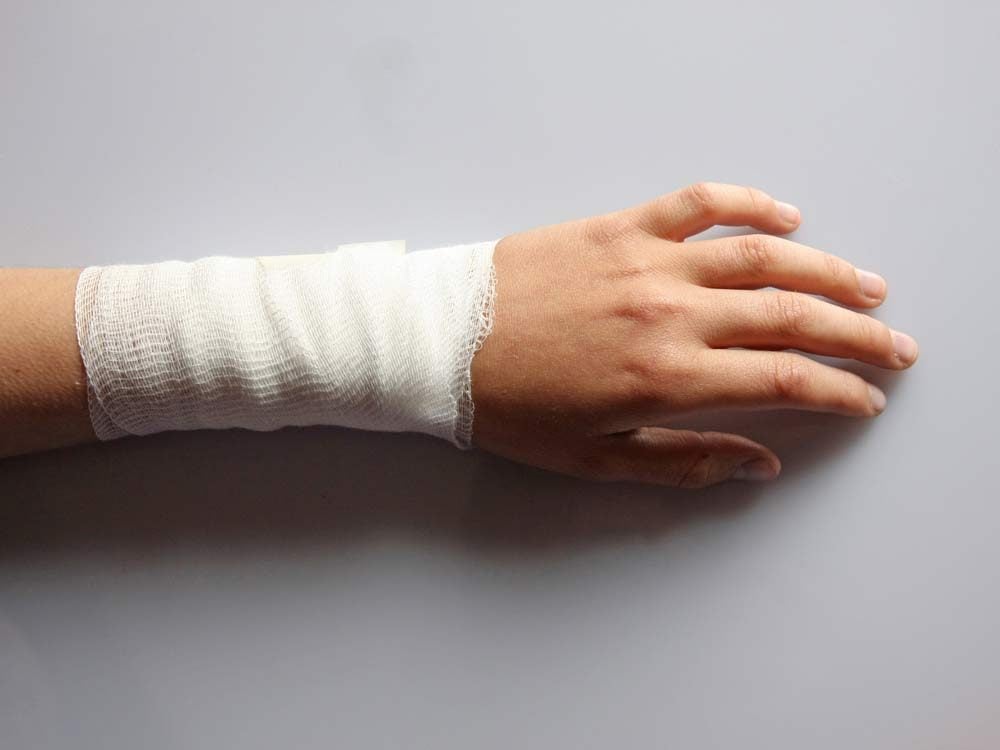
What to do when you get a burn or cut while cooking
“The first thing to do with a burn injury is to immediately flush it with water and apply an antibacterial ointment,” says Jerisa Johnson Berry, DO, who is board-certified in emergency medicine and works in several Florida hospitals. “Although it may hurt, it’s crucial to rinse the injury immediately, apply ointment, and cover.” If it’s more than a minor burn, call your doctor to assess. (Try these home remedies for minor burns.) If you cut yourself accidentally and the cut is deep, it’s important to visit your doctor or emergency room within 12 hours of the injury. Don’t wait any longer as waiting may cause inadequate wound healing and raise infection risk. “I had a patient wait over 24 hours to come in to the ER for large laceration and this delay prevents us from treating the wound optimally,” Dr. Berry says.